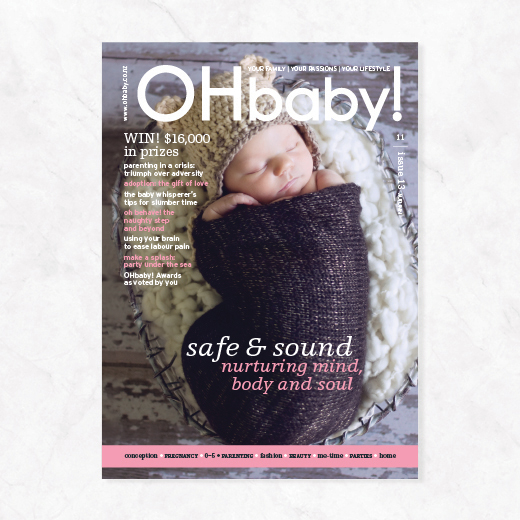Natural labour preparation

You've bought the cot and washed piles of tiny clothes, but what else can you do to prepare for the arrival of your baby? Natasha Berman shares 10 tips for holistic labour preparation.
It is never too early to prepare for labour. Labour preparation may differ depending on the needs of each woman and perhaps on whether it is her first or subsequent birth. As I write this article, I am preparing for the birth of my second child, and it strikes me how different my needs are this time around.
Before the birth of my first child I was excited but under-prepared and a little naïve. During the birth I felt I had little control over how it was proceeding because of my lack of experience. But for my second child I know what to expect and feel much better prepared. I have learned techniques in hypno-birthing, breathing during labour and visualisation. All going well, I will be able to have much more input into how the birth progresses.
This quote gives me some comfort: "300,000 women will be giving birth with you today. Relax and breathe and do nothing else. Labour is hard work and you can do it." - Unknown.
The following tips are intended to help reinforce your confidence as you approach your labour.
1. Choose a supportive LMC
Choose a midwife or medical practitioner with whom you share both a good rapport and compatible ideologies. This is your child's birth. The clearer you are about what kind of birthing experience you'd like, the more likely you will choose someone who will support your vision.
2. Ignore the horror stories
Don't listen to or read about what goes "wrong". Make it a priority to seek out and hear stories of other families' joyful experiences. Don't feel afraid to tell people to stop if they start to share negative details of their labour and birth. While it is important to acknowledge that complications can arise, it is counter-productive to dwell on the pain and problems of labour that may or may not be a part of your experience. Visualise, speak out and write down how you see your birth developing.
3. Write a birth plan
Take some time to discuss your birth plan with your husband/birth partner and midwife. Nominate someone to talk on your behalf if you need to go to hospital or a birthing centre. Your only job on the day is to relax and to focus on breathing and meeting your baby. Your midwife and birth partner are there to take care of everything else. Although it is great to have a clear idea of what you want, it is just as important to be prepared to follow whatever path your birth
takes, in a relaxed and calm way.
4. Choose a pain-management technique
Consider what helps you relax. Is it hypnosis, massage, or perhaps music? I completed a hypno-birthing course where my husband and I learned how to use relaxation, visualisation, and breathing techniques to help put my body and mind into a deeply relaxed state. I did not know these techniques the first time I gave birth and I feel much more confident now, knowing there is something I can do during a contraction to manage it.
5. Get some good advice
Many couples find it useful to attend antenatal classes but I certainly found that the best advice I ever received was focused on what happens after the baby arrives. Check out OHbaby! baby whisperer Dorothy Waide's tips on newborn sleep, and her bathing and swaddling techniques.
6. Get practical
- Get organised and attend to all the practical things that need to be done around the house well before your due week. Pay your bills in advance if possible, as it is surprisingly easy to forget about things such as opening the mail after the baby arrives.
- Preregister at the hospital. Pausing for paperwork when your stomach feels like it's turning inside out? No thanks.
- Wrap things up at work. I strongly recommend you stop all work commitments no later than one month before you are due to give birth.
- Treat yourself to some grooming - manicures, pedicures, waxing - whatever makes you feel pampered. Going to a day spa won't be at the top of your to-do list for a while, so enjoy one last baby-free session now.
- Stock up on nappies and wipes. Even if you intend to use cloth nappies, I recommend giving yourself a couple of weeks to get used to life with a baby without a whole lot of extra washing. The environment will forgive you for using disposables for a few weeks.
- Finish last-minute hospital bag packing.
- Install the car seat at least one month before you are due.
- Stock the cupboards, fridge and freezer and organise family and friends to drop off meals during the first few weeks. Ideally, some lovely friend will organise a meal roster for you, to prevent the delivery of five lasagnas all on the same day. Politely requesting some variety will help too, although my husband and I are still very grateful for every one of the 12 large bowls of spaghetti bolognese we were given after the birth of our first child!
7. Think natural
There are some beneficial natural remedies available to help prepare the uterus for birth and ease labour. I recommend the following:
- Quintessence Birth Mix - this homeopathic formula is specially designed to strengthen and prepare your uterus for childbirth. Use in the last four weeks of pregnancy.
- Quintessence Raspberry Leaf Tea - red raspberry leaves have a long tradition as a strengthening tonic for the reproductive system, especially during pregnancy.
- Quintessence Labour Ease Drops - to help ease the pain associated with labour, and to calm and soothe the nervous system.
8. Rest, rest, rest
Prior to, but also during, labour rest as much as possible. Concentrate on being hydrated and snack on healthy food. Surround yourself with things that give you joy, whether it's trashy TV, reading a good book, listening to music or laughing with friends. The luxury of a daytime nap becomes a long-distant memory once you have children, so indulge while you still can.
9. Get gravity on your side
Lying down during labour and delivery is unnatural and goes against the laws of gravity. Before you go into labour, familiarise yourself with the many positions that are suited and helpful for pushing a baby out, and practise them. Moving around freely, walking, moving your hips from side to side and squatting are all helpful things to do with your body during labour.
10. Let your voice be heard
Making deep guttural noises right from the core of your gut helps with relaxation and allows you to express yourself freely. Practise doing this when you are alone, before your due week. Be prepared to have your say during your labour, particularly regarding intervention or pain management. Make sure your support person knows what you want, in the event of you being unable to articulate your desires. If you experience complications, remember to use your BRAIN.
B: Benefits. What are the benefits of what is being suggested to you?
R: Risks. What are the risks of what is being suggested to you?
A: Alternatives. What are the alternatives?
I: Instincts. What are your instincts saying?
N: Nothing. If in doubt do nothing and reassess.
Preparing for labour is a hugely significant process and giving birth can be a very animalistic experience, unlike anything you will have encountered before. Welcoming a baby into your family is life-changing. It is important to have a relaxed approach, not only to the labour and birth process, but also the transition into your role as parents. My best advice? Relax - it is only a matter of moments until you meet your baby face-to-face. Think about your ideal environment for labour - people or no people, silence or music, space, good food, good smells, comfort.
And remember: "Just as a woman's heart knows how and when to pump, her lungs to inhale, and her hand to pull back from fire, so she knows when and how to give birth." ~Virginia Di Oro. Keep Virginia's words in mind - you are ready and you can do this.
| Natasha Berman is a naturopath and medical herbalist and managing director of Quintessence, a natural health dispensary in Titirangi, Auckland. The day before her son Eli's third birthday, Natasha happily and safely delivered her second son, Asher, at home. Read more from Natasha at qbaby.co.nz and allegenicstesting.com |

AS FEATURED IN ISSUE 13 OF OHbaby! MAGAZINE. CHECK OUT OTHER ARTICLES IN THIS ISSUE BELOW














